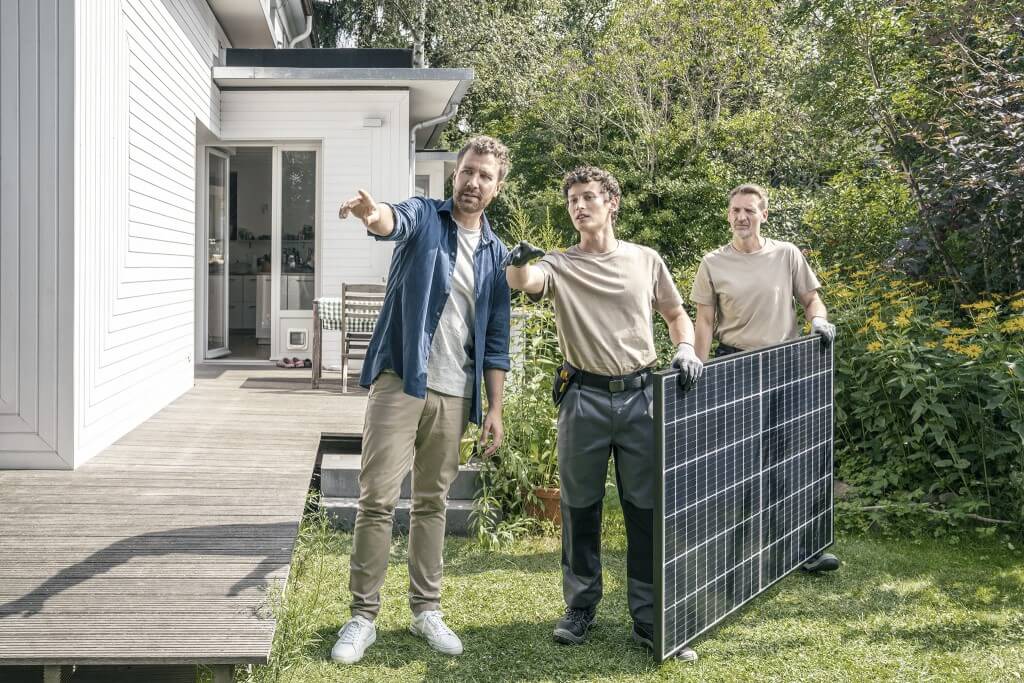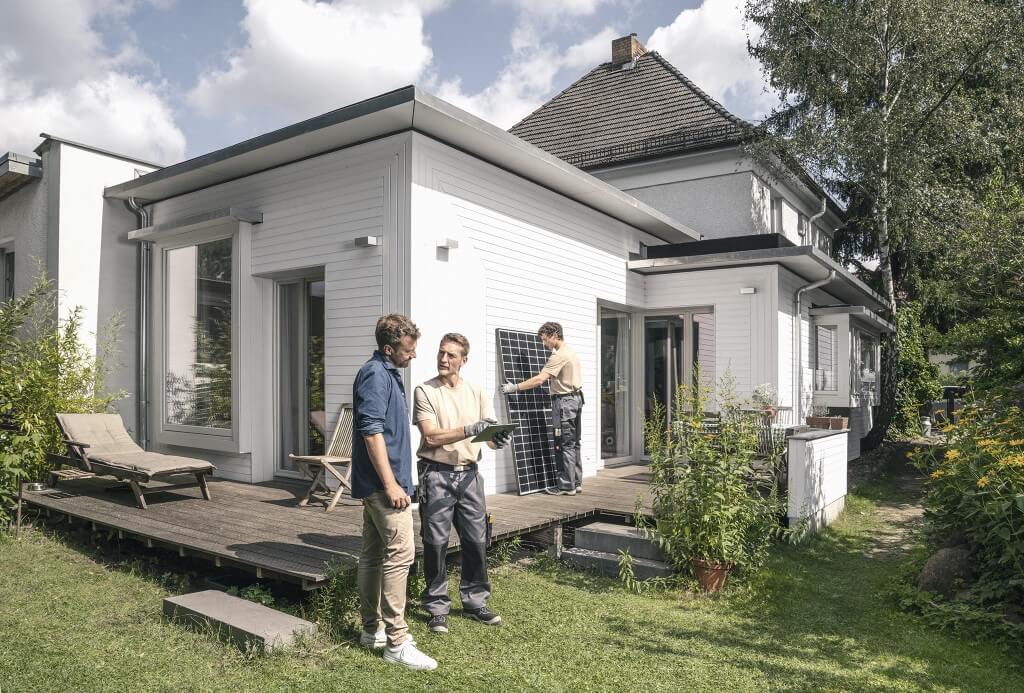The ongoing solar boom keeps the photovoltaic industry on its toes and can currently lead to delays and long waiting times. Those interested in PV should therefore allow sufficient time and a little buffer when implementing their PV project.
For this reason, some homeowners wonder whether they can avoid these long waiting times by installing their solar systems. This saves not only time but also costs. In addition, a solar system naturally represents a large investment. So why save on the installation to benefit more quickly from your PV system on the roof?

In this article, we summarize self-assembly’s advantages and disadvantages and explain the risks and dangers. Because the fact is: If you are thinking about self-assembly, consider a few basic things in advance and weigh up the risks carefully.
Can you install PV systems yourself? What is allowed by law?
In principle, installing a photovoltaic system on your roof is legally permitted. You are not obliged to hire a specialist company for all assembly steps. However, as you can see from this wording, there are certain exceptions. We briefly summarize which work steps of the PV installation you could take over yourself.
You can install the following components of your PV system yourself:
PV system, including DC cabling on your roof, power inverter for solar panels, and overvoltage protection. Large parts of the AC cable laying and its connection.
On the other hand, connecting the AC voltage side is not permitted, as the connection to the house feed and the public power grid. At this point, you are legally obliged to consult a registered and certified electrician.
As a rule, you do not need a solar system permit. Nevertheless, we recommend you ask the responsible building authority in writing whether your planned PV system does not require a permit. So you are on the safe side during and after the installation.
Should you install solar panels yourself? What speaks against it?
Based on the overwhelming number of disadvantages, you can already see that some points speak against installing your off grid solar system yourself. And even if you can find many instructions on installing a PV system on the Internet, we advise against it.
In the following, we will explain why these points could help you decide against self-assembly.
1. High level of difficulty
The difficulty of building your solar system depends, in particular, on the shape of the roof. If you are skilled in manual work and technology, consider installing the solar system yourself, but only if the circumstances allow it.
Because especially with high or steep roofs, but also those with special coverings such as slate, we recommend that you entrust the work to a specialist company. The risk of damaging components or risking your health is too high here. In this case, you should also contact a specialist company for the maintenance and care of the solar system that is familiar with a PV system and its peculiarities.
2. High-risk potential
In addition to the difficulty, the high-risk potential of doing the PV installation yourself plays a role. We see a particularly high-risk potential in these two areas:
There is always some risk of injury when working on roofs. If you install your system yourself, please ensure your safety. This also includes careful handling of the direct current on the roof. Since far more than the usual household 220 volts flow through the lines, you should also know exactly what you are doing here. The risk of a fire is also significantly increased if you install it yourself. Incorrect polarity and installation can result in a short circuit, which ultimately causes a fire. However, since self-assembly can eliminate the insurance coverage for the house, this can result in unimagined costs, which can ultimately mean financial ruin.
For these reasons, we advise against installing a professional solar system on your own.
3. Mains connection requires an electrician
Although the purchase and self-installation of a solar system initially sound quite simple, it is usually very difficult in practice. As you have already learned, it is usually possible for the homeowner to install a solar system on the roof. There is no obligation for third parties to install it. However, manufacturers and suppliers rightly recommend having the installation carried out by a specialist company.
Whatever you decide: In any case, the connection to the house’s electrical system and the public power grid can only be made by registered and certified electricians. Even those installing the system on the roof themselves are not authorized to connect it to their electricity consumers or the public grid.
Important: The connection to the public power grid is necessary so that you can benefit from the feed-in tariff from the EEG during the term of your solar system. You receive this for every kilowatt hour of solar power you cannot use in the household and therefore supply to the public grid.

4. Possible yield losses due to self-assembly
The installation of a solar system is quite a complex matter in which many factors and circumstances must be considered. In the planning process for a solar system, specialist consultants take the following standards, specifications, and requirements into account, among other things, to ensure optimal operation of the solar system:
Distance regulations on roofs wind and snow loads disturbing objects on the roof that could reduce the proper yield performance of the components rack systems suitable for the roof pitch and much more.
Although you can find many installation instructions or complete photovoltaic kits for self-assembly on the Internet, the safety precautions to be observed or possible yield-reducing factors are often not immediately obvious to laypeople.
For these reasons, too, it makes sense to consult a specialist company. When planning and implementing a specialist company, you benefit from the following advantages in addition to the factors mentioned above:
Personal contact: individual and optimal system planning previous needs analysis taking into account all requirements and wishes perfectly coordinated components maximization of your yield.
Solar technicians, therefore, have the opportunity to create an optimal system plan for you, which includes all the circumstances in the calculation and can ensure the maximum yield with the help of perfectly coordinated components.
5. Possible lapse of warranty and insurance claims
When installing a solar panels system, many factors have to be considered that can affect the quality requirements of the components. The manufacturers of solar modules, in particular, usually specify certain assembly instructions and installation procedures that must be followed to maintain the module guarantee.
Since the guarantee for solar modules is usually 25 years, these instructions should not be neglected under any circumstances. The smallest mistake here can mean a warranty lapse, which in the worst case, can end in a financial disaster. The guarantee is only valid if the mini solar panels are installed properly and professionally. On the other hand, if you install the modules and all the necessary components yourself, you risk jeopardizing your warranty.
Another factor to consider is ensuring the facility and your home in general. With most statutory insurers, all insurance coverage for your system expires as soon as you decide to install a solar system yourself. This primarily concerns the complex electronics that are installed in a PV system. If this is incorrectly attached to the roof, this can lead to complications and even fires that can destroy the system and the house.
Do the pros and cons apply to all solar systems?
Anyone who does not want to do without building their small solar system and has no previous technical or electronic knowledge should limit themselves to installing smaller photovoltaic sets that can be interconnected to a voltage of 48 V. In this case, no training in the electrical field is required.
As a rule, the individual sets consist of a solar module with an output of 100 Wp and 12 V voltage, a charge controller, sufficient solar cables, the necessary plugs, and a battery connection cable. Such a set is suitable for realizing smaller off-grid solutions that can charge a battery with solar power or supply electricity to smaller consumers and can usually be connected in series with several sets to increase the output.
Even when buying and installing such a small solar system yourself, it is important to select the right components, adapt them to each other and install them with the help of suitable instructions. If necessary, a solar technician should also be consulted here.
Conclusion
By assembling your solar system yourself, you can save installation costs and avoid possible waiting times. However, there are also some risks and disadvantages that you should be aware of:
Even if you largely assemble your solar system, registered and certified electricians may only carry the house and mains connection. Installing your solar system yourself can result in your solar system generating low yields. It is, therefore, always worthwhile to have the components optimally coordinated by a specialist company – and to have all requirements and wishes included in the planning. Only then can your PV system work economically. The guarantee and insurance claims will likely expire if you install your solar system. In the event of damage, you are not adequately protected and may have to bear the costs yourself. Installing the PV system yourself entails a high-risk potential. Electric shocks or the outbreak of fire are possible sources of danger. Depending on the shape of the roof, the angle of inclination, and the covering, the degree of difficulty of the PV installation also increases. If you want to avoid the risk of an accident or damage to the components, you should rely on a specialist company.
Do you want to plan your solar system individually – and have it adapted to your requirements and wishes? The solar online configurator and our solar experts will help you with the optimal planning and implementation of the solar system for your home.